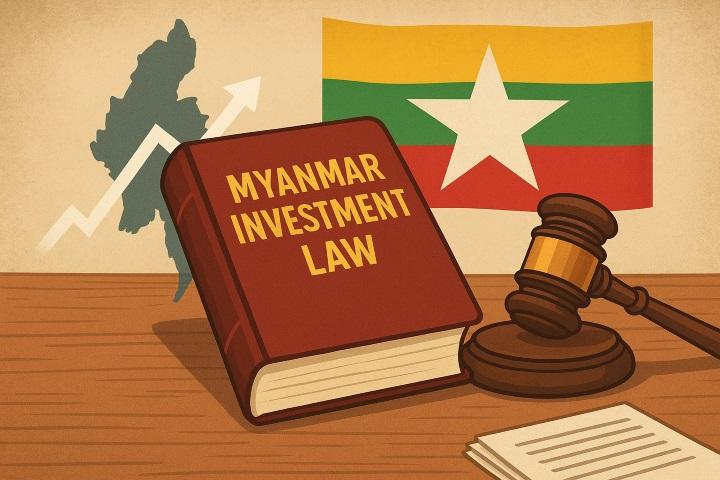Understanding the Myanmar Investment Law: A Guide for Business Owners and Investors
The Myanmar Investment Law (Pyidaungsu Hluttaw Law No. 40/2016) was enacted to promote responsible, sustainable, and transparent investment within the country. Together with the Myanmar Investment Rules (2017), it provides a clear framework for both local and foreign investors to operate with legal protection, tax benefits, and procedural clarity.
1. Purpose of the Investment Law
The law was designed to:
- Encourage responsible investment that supports national development.
- Ensure equal treatment for both Myanmar and foreign investors.
- Protect investor rights and assets under fair and transparent regulations.
- Promote job creation, technology transfer, and skill development.
- Support environmentally and socially responsible business practices.
2. Role of the Myanmar Investment Commission (MIC)
The Myanmar Investment Commission (MIC) oversees the implementation of the Investment Law.
Its main responsibilities include:
- Evaluating and approving investment proposals and endorsements.
- Granting tax incentives, land-use rights, and investment benefits.
- Monitoring investment activities for compliance with laws and environmental standards.
- Advising the government on investment promotion policies.
Investors typically engage with the MIC through either a Permit or an Endorsement, depending on the size and nature of their business.
3. Types of Investment Applications
(a) MIC Permit
A permit is required for projects that are:
- Nationally strategic or large-scale (over USD 100 million).
- Likely to have a significant environmental or social impact.
- Involving state-owned land or infrastructure.
(b) MIC Endorsement
An endorsement is issued for other investment activities that do not require a permit but wish to benefit from:
- Tax exemptions or reliefs.
- Long-term land lease rights.
- Import duty concessions.
4. Investor Rights and Guarantees
The Myanmar Investment Law provides strong legal guarantees for investors:
- Protection from nationalization: No investment shall be nationalized or expropriated without fair compensation.
- Right to transfer funds: Investors can freely transfer capital, profits, dividends, and other earnings in foreign currency.
- Equal treatment: Foreign and local investors receive fair and non-discriminatory treatment under the law.
- Access to dispute resolution: Disputes can be resolved through mediation, local courts, or international arbitration.
5. Tax Incentives and Reliefs
To encourage economic growth and regional development, the law offers several tax incentives:
- Income tax exemption for:
- 7 years in Zone 1 (less developed areas).
- 5 years in Zone 2 (moderately developed areas).
- 3 years in Zone 3 (developed areas).
- Customs duty exemptions for importing machinery, raw materials, and construction equipment.
- Tax relief for reinvested profits and approved research and development (R&D) expenses.
- Accelerated depreciation benefits for capital assets used in business operations.
These incentives are designed to promote investments in manufacturing, agriculture, energy, infrastructure, and service sectors.
6. Promoted and Restricted Sectors
The MIC regularly issues notifications listing promoted investment sectors, which may enjoy additional tax benefits.
Examples include:
- Agro-based and value-added industries.
- Manufacturing and export-oriented businesses.
- Renewable energy, power, and infrastructure projects.
- Education, healthcare, tourism, and technology services.
Certain businesses are restricted or prohibited, such as those affecting environmental conservation, cultural heritage, or national security. Foreign investors may be required to partner with Myanmar citizen-owned entities in specific restricted sectors.
7. Land Use and Leasing Rights
Investors with an MIC Permit or Endorsement can lease land for:
- Up to 50 years, with the option to renew for two additional 10-year terms.
- Longer lease periods may be allowed for investments in remote or underdeveloped regions.
All land lease agreements must be properly registered under the Registration Act.
8. Employment and Local Development
The law encourages investors to contribute to Myanmar’s human resource development.
Key requirements include:
- Employing Myanmar citizens for general positions.
- Providing training and skill development to promote local management capacity.
- Ensuring fair wages, benefits, and compliance with labor laws.
9. Responsible and Sustainable Investment
Investors are required to:
- Respect local culture and community traditions.
- Comply with environmental and social impact assessment requirements.
- Avoid pollution and protect natural resources.
- Maintain transparent accounting and reporting standards.
Responsible business conduct helps create a positive investment reputation and builds long-term trust with regulators and communities.
Conclusion
The Myanmar Investment Law creates a stable, transparent, and investor-friendly environment.
It balances investment promotion with social and environmental responsibility, making it essential for every business owner and investor to understand before entering the Myanmar market.
Whether you are a local entrepreneur or an international investor, familiarity with this law is the foundation for sustainable, compliant, and successful business operations in Myanmar.
